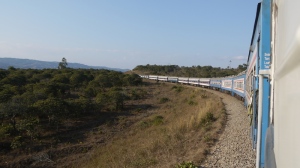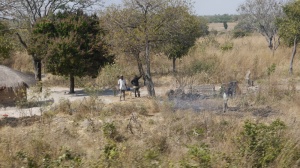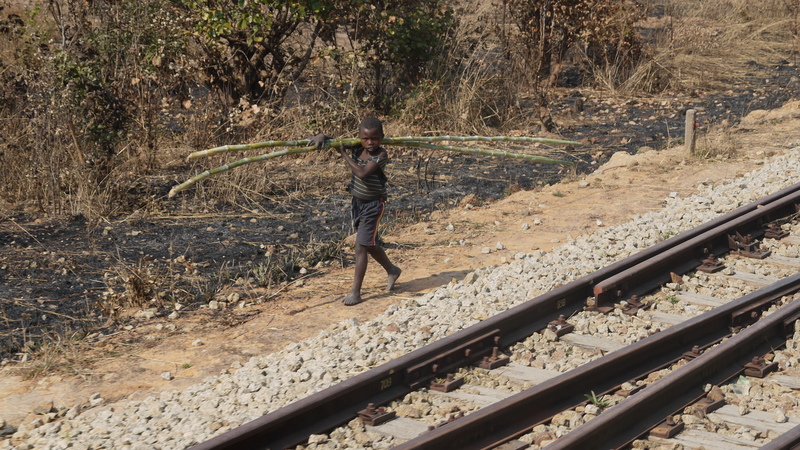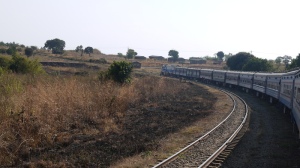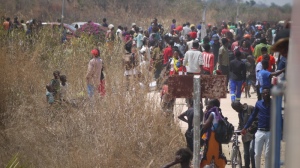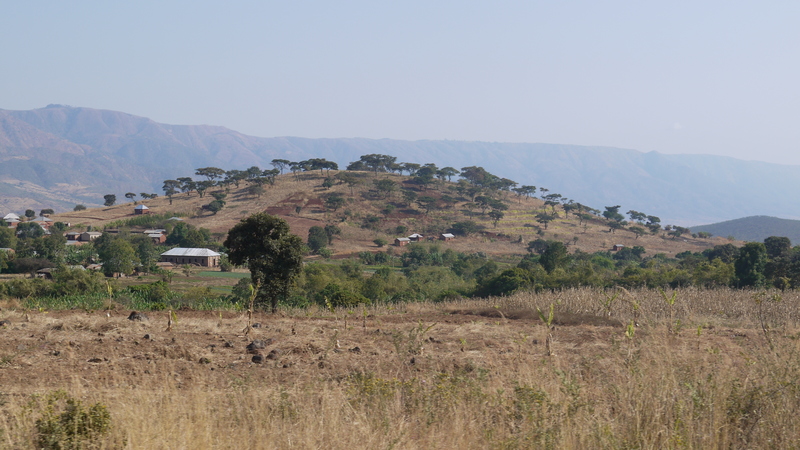Let’s call it driving, riding, moving … even if the train’s downtime has at least felt like it exceeded the driving times. But let’s start right at the beginning.
Spring 2017, now it was clear, that FOSS4G 2018 would take place in Dar Es Salaam, Tanzania. That meant there was plenty of time to think about how to make a trip around it. After researching the Internet, I came across the TAZARA train connection between Zambia and Tanzania, which was to become the heart of my journey. The idea to travel from ocean (Atlantic) to ocean (Indian Ocean) developed quite fast from this. Or from Namibia to Tanzania, West to East or from the former German Southwest to the former German East Africa or just across southern Africa.
In spring 2018 it was fixed that my journey would start with 2 weeks family holiday in Namibia and will then continue with a travel to the Victoria Falls, Lusaka and then to New Kapiri Mposhi in the Zambian copper belt, from where the TAZARA train starts.
Simply online is not possible and therefore I reserved my TAZARA ticket in early summer 2018 by telephone directly at the train station in Kapiri Mposhi – and was curious at the same time whether it would work out. By the way, TAZARA stands for TAnsanian-SAmbian RAilway Authority, which operates a train connection that was built during apartheid times by Chinese engineers from the copper belt of Zambia to the port of Dar Es Salaam. On that route, a passenger train runs twice a week in each direction. 1865 kilometres in prognosticated 52 hours across the Zambian-Tanzanian savannah, that’s what I now have ahead. When I picked up my ticket weeks later in the Zambian capital Lusaka and paid 360 Zambian Kwecha (which is ~27 Euro), it was already clear to me that despite having a 1st class ticket, I should not expect too much comfort.
So I started on Friday morning, the approx. 150 km long route from Lusaka to Kapiri Mposhi by bus, because although there are trains of the Zambian Railway Company, which run from Lusaka to Kapiri, they are of course not coordinated with each other, that you could travel by train from Lusaka.
The trains from Lusaka run every Wednesday and Saturday (I didn’t get this information at the TAZARA headquarters in Lusaka, but at the main station in Lusaka), while the TAZARA train from Kapiri to Dar starts every Tuesday and Friday. No sense? However, the train supposedly takes 12 hours, so the bus is faster anyway. Also exciting to go to the bus station in Lusaka as a white man and just even do not think, that you are not expected to just simply buy a ticket on your own – but this is another story and I will write on that later, perhaps.
The arrival at the TAZARA terminal station is really exciting, a huge, slightly dilapidated waiting hall, well filled with people, suitcases, bags, sacks and what I don’t know-yet-everything in which there was exactly another European beside me. While the train is being put together on the tracks outside, I concentrate on this next section of my journey, my bags filled with superfluous provisions, all batteries charged and eagerly awaiting the next two comma X days.
That time I still believed in a maybe 4-5 hours delay, but more about that – much – later. I just mention, that I do not expect anyone to complain about few minutes delay in the Deutsche Bahn any more! This is silly.
When boarding the ticket is shown for the first time, a process that should be repeated about 8 times in the first 12 hours of the ride, but not afterwards. I get hold of one of the lower flatbeds in our 4-persons 1-class compartment, stow my suitcase underneath and first sit down at the window, which already required contact with decades-old rubbers to open – nothing for cleanliness fanatics.
Even the feudel (*rheinish: cleaning rag), which was hung out of the window to dry after cleaning the hallway many times, has already passed its zenith for European standards in imperial time.
With a loud whistle, a rack, both accompanied by a jerk smashing through the old steel of the wagons, the train starts to move and immediately the radak-radak, now for many hours always the concomidant sound, caused by the tracks laid decades ago and hardly maintained since then, sets in. But it works, the train moves and each radak brings me a bit closer to Dar Es Salaam, the destination of this trip.
I began to suspect, that the journey would perhaps be more than just looking out of the window. My fellow passengers in the compartment, a Zambian living in London with an 8-year-old son living in Kampala, Uganda, and Wise, a guy also from Zambia on the way to Nakonde, the last Zambian city before Tanzania, should play an important role.
After several radaks and some first exchanged sentences with Rama, the Zambian Londoner, I go on a trip to discover the train. The trip ends already 3 cars further, because between the 2nd and 3rd class there is the bar, type corner-pub. No beer before four is an obviously negligible rule in rolling African trains, one only has to look around. This is also what Wise, our Sambian neighbour, thinks and so we start to drink and talk.
We cheerfully, first alternately, later only me for both, buy fresh beers, only to pour these directly into our heads. The whole evening is based on the interculturally equally valid motto the little bit we have to eat, we can also have as drinks. So, no dinner today, we just get some peanuts bought from locals at on one of our stops directly through our window.
After our party, after which we ended up completely drunk, I overslept the nightly radaks then, but in the morning a hard and violent rack wakes me up. This one is presumably caused by a blocking brake on at least one wagon, which probably demands some skill from the train driver.
As far as I know, an anti blocking system (ABS) works similarly, braking, letting go, braking, letting go and that’s exactly what the driver can do manually in a perfect way to stop the train at the numerous stations.
No time for headaches, because breakfast and a hungry Krischan, the 8-year-old son of Rama, are waiting. If you think of breakfast now, you certainly don’t think of a sad-looking lukewarm sausage, an omelette, spaghetti without sauce and an English-split slice of untoasted toast. Served with tea or a far too thin instant broth that is very remotely reminiscent to coffee. The whole thing reminds me a little on the Legionary food described in Asterix as Legionnaire, consisting of cheese, corn and bacon, which is cooked together for rationalization reasons. Unfortunately in the morning I miss the magic potion to grab the cook.
After all, Krischan is happy about my sausage while Rama is surprised about the waiter who puts the sugar bowl near the already sweetened tea. Result: Much too sweet tea. Teaching is as useless as trying to convince the waiter to fill my cup only half with water in order to get any coffee taste out of this poor instant powder. Unfortunately, I am also missed to take a picture of this really interesting composition.
Outside, the little variable Zambian bush passes by. Again and again you can see smoke on the horizon, which results either from the numerous charcoal piles or from deliberately inflamed bush fires. Occasionally small villages with 5-7 round clay huts appear between the few bigger trees or fields, children come from somewhere, hastingly waving at us, crying something I do not understand, farmers stop to work in their fields and watch our train. I really would like to know what they think.
If we see anything like traffic at all, then some Zambians on bicycles, unless a stop in a larger town allows a view of the T2, the Great Eastern Road, which leads from Kapiri to the east towards Malawi and Tanzania. Otherwise we drive through the deepest bush, I guess that the train is, at least for the small stops, obviously the only connection to the rest of the world, which shows up again later.
For now I notice that in front, towards the 3rd class, most business is done, while behind with us at the 1st and 2nd class there are a lot of children begging. Since a stop usually lasts at least 20 minutes, the traders later also come over to us, offering peanuts, bananas, drinks or smaller dishes. However, business at the 1st and 2nd class is much more randomly. If something is bought, it is traded before in principle – partly also still, although the train set itself already again in motion
Inside I sit for the first time with my 3-pin plug at one of the two sockets known to me to charge my mobile phone, laptop and battery of the camera. Krischan’s tablet must also be charged, the little guy starts to get bored. Meanwhile life in the train has somehow become jerky, I only notice radaks, racks and the ABS-like braking, when I pay attention to it.
Towards evening we reach Nakonde and our beer-drinking Sambier (Sam-beer?) Wise leaves us happily, he has made the train journey again and is expected in his home village by family and friends. Among us onward travellers first rumours circulate about a current delay of 4, 8 or even up to 12 hours, but nobody knows anything exactly. While I think about what this means, the Zambian border officials come through the train, check and stamp passports, it takes time. This was now the departure from Zambia. At some point the train finally starts to move again with a jerk, but not for much distance, because Tunduma, the 1st Tanzanian city borders directly on Nakonde and we are now standing at the Tunduma station platforms. It already dawns, I get out and enter the first time Tanzanian ground, the now 4th country of my African journey.
Back in the compartment, money changers go through the train and change Zambian Kwecha into Tanzanian shilling. The exchange rate is, let’s say, creative. Luckily I already carry 70.000 Schilling (about 28 Euro) since Bonn across Africa, but I also exchange my last 150 Kwecha (~12 Euros), fearing that there is no way to change it later in Dar Es Salaam. The money exchanger is followed by a man who sells Tanzanian SIM cards. Fortunately, he sets them up, because after Namibia, Zimbabwe and Zambia, the official language changes from English to Swahili. And exactly in this language the numerous instructions arrive my phone via SMS, which inform one, how one sets up the new SIM card. Anyway, I now have 1GB free data transfer, a Tanzanian phone number that I don’t remember and – Internet connection!
Contrary to all announcements at home, I now can report from the train directly and announce myself as alive and healthy. It’s a good thing that smell can’t be transmitted yet, Rama orders fish for dinner and I haven’t been able to take a shower for almost 2 days, the shower is broken, of course.
Now the Tanzanian border guards come in, followed by a doctor who also checks the vaccination passes for yellow fever vaccination after the passports are checked. And now I am really happy that, in addition to my Tanzanian visa, I have already had the yellow fever vaccination at home in Bonn. The Dutch guy, the other European who entered the train Kapiri, gets his vaccination for 50 dollars directly on the train.
Hours later, hey, I am ready, I think, but the train still stands – since hours. At some point I find out that we wait for the opposite train that left Dar Es Salaam at the same time as ours Kapiri. An encounter on a free track would not be very recommendable, as the track is single-track and here in Tunduma both trains have arranged to meet for a rendezvous. It’s stupid, as with every rendezvous, if one comes too late.
I find it interesting that the counter train is the so-called express train, but good, that’s Africa! Why get excited? Useless exercise.
I drink 2-3 beers in the corner-pub, which I now have to pay with Tanzanian shilling and whose price has miraculously fallen from about one Euro in Zambia to now around 80 cents, the same beer by the way. Afterwards I go to sleep in my so-called bed. Sometime, I already felt at half sleep, I feel the rack and the train finally starts again moving towards Dar.
You could say now what a beautiful story, but when I wake up around 6 in the morning, the train stands again, my map tells me, that we are in Mpemba, the next Tanzanian city and no far travel from the border. I don’t get the reason for this stop. This standing around gets on my european nerves at some point and I catch myself trying my best to find out if Mpemba has an airport and when flights to Dar Es Salaam leave (actually there were 3, but luckily all booked out for that day). While catching myself, I reject my plan again – this train trip was the trigger and the reason for the whole tour, so keep calm and don’t even think about doing silly things.

Our brave locomotive – also runs on 7 pots (note the blurred left part of the picture – diesel soot).
In the meantime I figured out, that our locomotive is broken. Later, when I meet David, the Zambian engineer who repaired the locomotive, because he is the new guy in our compartment as well, I learn that the TAZARA diesel locomotives have 8 electric generators each, which in turn push the locomotive. And ours started with only 7 working generators and when the next generator said goodbye, nobody believed the remaining 6 would make the trip through the Tanzanian highlands. So David had to repair, without spare parts and with bad equipment. Call him hero of the day, as he succeeded in the repair. Unfortunately an arrival on Sunday evening in Dar Es Salaam became now completely impossible and I waved another night on my flatbed and my fellow travellers another with me, still being unshowered. Better not to think about my comfortable 4-star hotel room waiting for me in Dar Es Salaam…
But we are in Africa, so think positive. Before I started my trip, I had my greatest fears regarding my safety when I thought about my late arrival in Dar, because the station is far outside and European travellers of TAZARA have been lured into fake taxis and robbed several times during night-times. For sure, I wouldn’t have the problem any more when arriving monday at noon. And I also didn’t believe that the driver, I requested from the hotel, would really spend half the night at the station, not even in Africa.
The landscape outside is overwhelming, mountains, bush, in small villages brick kilns, banana plantations and very soon the first coconut palms appear. Regularly, whenever the train stops, I have Internet connection to the outside world, which ends shortly after the respective place changes back into bush. That the speed exceeds that of an average German mobile Internet reception by a multiple may surprise, but is true. Interestingly, Tanzanians ride motorcycles where Zambians were still cycling. And interesting to see, how many people may sit on one motorbike! And finally there remains that story with the tomatoes and the rice.
As already mentioned, the train is a means of transport, a lifeline and obviously also a trade route. At the next stop, I hear women from outside shouting Njana Njana.
I look out of the window, around the train at least 30 women walk, all with a bag full of tomatoes in each hand and one on the head. By the way, this technique of transporting things must have it’s roots here in Tanzania. On the other side – who the hell wants to buy all these tomatoes? I ask myself, but concentrate on photographing the traders and other people.
The train starts moving again, I turn around and see … Tomatoes in sacks. Sacks full with tomatoes everywhere – on tables, benches, in the hall – as said, tomatoes everywhere. I ask Rama what the hell are all these tomatoes for. He grins and says wait. What else can I do?
We rattle on, radak, radak the train shouts, the green landscape and people roar past, unfortunately we do not see any wild animals, but again and again small villages come by, we cross small brooks or rivers, they certainly do not have a water problem here. I sit in the restaurant at a table not occupied by tomatoes and work on my talks for the conference. After almost three weeks in Africa, it is strange to do something as profane as preparing talks for a conference.
The next stop, this time rice is sold. Tons of rice. And of course it is also brought to the train on heads. This time the trade takes place as an exchange: tomatoes for rice, sorry, but I can not tell you anything about the tomato/rice course. As the trains goes on, everywhere, where the tomatoes have been stored, I now see sacks full of rice. I wonder again, what do you do with such amounts of rice in a rolling train?
I ask Rama, who now is willing to explain me that the people buy the tomatoes where they are cheap, then exchange them for rice, also where it is cheap and bring the rice to Dar Es Salaam. In Dar, the rice is sold, because there it is 3 times more expensive and that way, the people pay for their train tickets. So simple. By the way, a smiling Rama points under his flatbed, where a rice sack is stored…
David, the TAZARA technician, explains to me how the tracks are maintained. At each station there are two people in charge, who then drive with an adventurous dragine-like rail vehicle half of the way towards the next station in one direction and in the 2nd half of a week half of the way towards the other station, checking the tracks and either repairing or reporting damages. The last generation of new Chinese locomotives were directly discarded again, too much electronics that do not survive the tracks and that cannot be repaired by hand, so the old material is patched up again and again. And the whole effort is hardly necessary nowadays, because after the end of apartheid the South African ports are actually closer and much easier to reach from Sambia, than Dar Es Salaam. Nevertheless, the TAZARA line still runs 7 copper trains per week with a maximum speed of 30 km/h. Phew, we are allowed to drive 50km/h top.
After the 3rd night on monday morning (remember, the train started on a friday) we drive through a game reserve. Finally there are wild animals! I see several elephants, zebras, three giraffes, a few monkeys and countless impalas along the way during the always same breakfast. Unfortunately, everything goes very fast, so that it is pointless to take photos. Once I think I saw a lion family lying under a tree, but maybe it was just a dream. Do I already fantasize?
radak, radak.
radak, radak.
And finally: We approach Dar Es Salaam. The train runs through the never-ending outskirts, I have the feeling that it goes faster than ever before. And suddenly: full braking, this time without any ABS-efforts. Obviously the train was too fast. I fear that there is an accident with a person, at home this would easily cause a delay of 8-10 hours.
I already see my chances for my night in a 4 star bed with shower slipping away. But, we are in Africa, and although I have no idea what really happened, after eternally long 20 minutes it makes rack ,followed by the monotonous and in hte meantime well-known radak, radak – the train continues! 4-star bed, shower, dinner, bath, pool, ocean, soft towel, civilization – I’m coming!
Finally we reach the terminus of Dar Es Salaam, 70 hours after our departure and thus with just 18 hours delay. The next one who grumbles in the german ICE because on a 20-minute delay, gets to know me!
At the exit of the station there is a last ticket check, the sense of which is not revealed to me, but it doesn’t have to be everything. It’s humid, you almost feel the nearby ocean. I take a taxi. A policeman notes down the taxi number, my name and my destination, to make sure that I get there safe. I pay in advace, the taxi driver does not have the money to pay for the parking fee and he brings me through the really interesting traffic to my shower…

